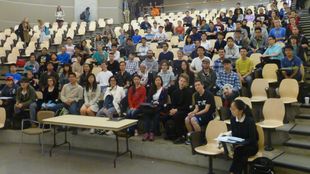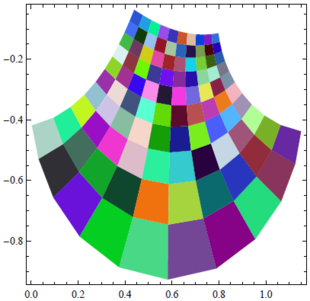14-240/Tutorial-October7: Difference between revisions
(→Boris) |
(→Boris) |
||
| Line 15: | Line 15: | ||
:Assume that <math>W_1 \cup W_2</math> is a subspace. |
:Assume that <math>W_1 \cup W_2</math> is a subspace. |
||
:Let <math>x \in W_1 |
:Let <math>x, y \in W_1 \cup W_2</math>. |
||
:Then <math>x |
:Then <math>x + y \in W_1 \cup W_2</math> and <math>x + y \in W_1 \or x + y \in W_2</math>. |
||
:Then <math>x + y \in W_1 \or x + y \in W_2</math>. |
|||
:Case 1: <math>x + y \in W_1</math>: |
:Case 1: <math>x + y \in W_1</math>: |
||
::Since <math>x \in W_1</math> and <math>W_1</math> has additive inverses, then <math>(-x) \in W_1</math>. |
::Since <math>x \in W_1 \cup W_2</math> and <math>W_1 \cup W_2</math> has additive inverses, then <math>(-x) \in W_1 \cup W_2</math>. |
||
::Then <math>(x+y)+(-x)=y \in W_1</math>. |
::Then <math>(x+y)+(-x)=y \in W_1</math>. |
||
| Line 29: | Line 27: | ||
:Case 2: <math>x + y \in W_2</math>: |
:Case 2: <math>x + y \in W_2</math>: |
||
::Since <math>y \in W_2</math> and <math>W_2</math> has additive inverses, then <math>(-y) \in W_2</math>. |
::Since <math>y \in W_1 \cup W_2</math> and <math>W_1 \cup W_2</math> has additive inverses, then <math>(-y) \in W_1 \cup W_2</math>. |
||
::Then <math>(x+y)+(-y)=x \in W_2</math>. |
::Then <math>(x+y)+(-y)=x \in W_2</math>. |
||
| Line 62: | Line 60: | ||
=====Error in Proof 1===== |
=====Error in Proof 1===== |
||
The error in the proof is the equivalence of these two statements. |
The error in the proof is the logical equivalence of these two statements. |
||
(1) Let <math>x \in W_1 |
(1) Let <math>x, y \in W_1 \cup W_2</math>. ... Then <math>x \in W_2 \or y \in W_1</math>. |
||
(2) Then <math>W_1 \subset W_2 \or W_2 \subset W_1</math>. |
(2) Then <math>W_1 \subset W_2 \or W_2 \subset W_1</math>. |
||
We can rewrite (1) and (2) to see their difference from each other: |
|||
(1) <math>\forall x \in W_1, \forall y \in W_2, (x \in W_2 \or y \in W_1)</math>. |
|||
(2) <math>(\forall x \in W_1, x \in W_2) \or (\forall y \in W_2, y \in W_1)</math>. |
|||
Revision as of 14:00, 13 October 2014
| |||||||||||||||||||||||||||||||||||||||||||||||||||||||||
Boris
Subtle Errors in Proofs
Check out these proofs:
Proof 1
Let [math]\displaystyle{ W_1 }[/math], [math]\displaystyle{ W_2 }[/math] be subspaces of a vector space [math]\displaystyle{ V }[/math]. We show that [math]\displaystyle{ W_1 \cup W_2 }[/math] is a subspace
[math]\displaystyle{ \implies W_1 \subset W_2 \or W_2 \subset W_1 }[/math].
- Assume that [math]\displaystyle{ W_1 \cup W_2 }[/math] is a subspace.
- Let [math]\displaystyle{ x, y \in W_1 \cup W_2 }[/math].
- Then [math]\displaystyle{ x + y \in W_1 \cup W_2 }[/math] and [math]\displaystyle{ x + y \in W_1 \or x + y \in W_2 }[/math].
- Case 1: [math]\displaystyle{ x + y \in W_1 }[/math]:
- Since [math]\displaystyle{ x \in W_1 \cup W_2 }[/math] and [math]\displaystyle{ W_1 \cup W_2 }[/math] has additive inverses, then [math]\displaystyle{ (-x) \in W_1 \cup W_2 }[/math].
- Then [math]\displaystyle{ (x+y)+(-x)=y \in W_1 }[/math].
- Case 2: [math]\displaystyle{ x + y \in W_2 }[/math]:
- Since [math]\displaystyle{ y \in W_1 \cup W_2 }[/math] and [math]\displaystyle{ W_1 \cup W_2 }[/math] has additive inverses, then [math]\displaystyle{ (-y) \in W_1 \cup W_2 }[/math].
- Then [math]\displaystyle{ (x+y)+(-y)=x \in W_2 }[/math].
- Then [math]\displaystyle{ x \in W_2 \or y \in W_1 }[/math].
- Then [math]\displaystyle{ W_1 \subset W_2 \or W_2 \subset W_1 }[/math]. Q.E.D.
Proof 2
Let [math]\displaystyle{ V=\{(a_1, a_2):a_1, a_2 \in R\} }[/math]. Then [math]\displaystyle{ \forall (a_1, a_2), (b_1, b_2) \in V, \forall c \in R }[/math], define
[math]\displaystyle{ (a_1, a_2) + (b_1, b_2) = (a_1 + 2b_1, a_2 + 3b_2) }[/math] and [math]\displaystyle{ c(a_1, a_2)=(ca_1, ca_2) }[/math]. We show that [math]\displaystyle{ V }[/math] is not a vector
space over [math]\displaystyle{ R }[/math].
- We show that [math]\displaystyle{ V }[/math] is not commutative.
- Let [math]\displaystyle{ (a_1, a_2) = (0, 0) }[/math].
- Then [math]\displaystyle{ (0, 0) + (b_1, b_2) = (2b_1, 3b_2) \neq (b_1, b_2) = (b_1, b_2) + (0, 0) }[/math].
- Then [math]\displaystyle{ V }[/math] is not commutative.
- Then [math]\displaystyle{ V }[/math] is not a vector space. Q.E.D.
Can you spot the subtle error in each?
Error in Proof 1
The error in the proof is the logical equivalence of these two statements.
(1) Let [math]\displaystyle{ x, y \in W_1 \cup W_2 }[/math]. ... Then [math]\displaystyle{ x \in W_2 \or y \in W_1 }[/math].
(2) Then [math]\displaystyle{ W_1 \subset W_2 \or W_2 \subset W_1 }[/math].

